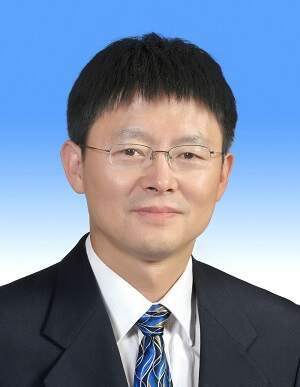
-
Shengdian Wang, Ph.D, Prof.
-
Principal Investigator
Chinese Academy of Sciences Key Laboratory of Infection and Immunity,IBP
Research Interests: Memory T cell development, DC differentiation, Tumor immunological microenvironment during tumor development and therapy
Email: sdwang@ibp.ac.cn
Tel: 010-64888493
Address: 15 Datun Road, Chaoyang District, Beijing, 100101, China
Chinese personal homepage
- Biography
-
1998 Ph.D., Chinese Academic Medical Science/Beijing Union Medical College
1998 - 2004 Postdoctoral fellow/ Research Associate, Department of Immunology, Mayo Medical School, Mayo Clinic, USA
2004 - 2005 Research Associate, Johns Hopkins University School of Medicine, USA
2005 - Professor, Institute of Biophysics, Chinese Academy of Sciences
- Awards
- Membership in Academies & Societies
- Research Interests
-
Our past studies made significant contributions to determining the critical role of immune system in antitumor effects of conventional cancer treatments. At present, we focus on the molecular and cellular mechanisms of antitumor immune responses and immune suppression in tumor microenvironment to identify the dominant immunosuppressive components that inhibit tumor-specific T cell responses. We are also interested in molecular mechanisms of memory T cell differentiation and function, which is important for controlling tumor recurrence. These studies will shed light on improvement of conventional cancer treatments and development of new tumor immunotherapies.
- Grants
- Selected Publications
-
1. Li X, Wang P, Li H, Du X, Liu M, Huang Q, Wang Y,Wang S*.The efficacy of oncolytic adenovirus is mediatedby T cell responses against virus and tumor in Syrian hamster model.Clin Cancer Res.2017 Jan 1;23(1):239-249.
2.Wang S*,Jia M. Antibody therapies in cancer.Adv Exp Med Biol.2016, 909:1-66.
3. Liu Z, Han H, He X, Li S, Wu C, Yu C,Wang S*.Expression of the galectin-9-Tim-3 pathway in glioma tissues isassociated with the clinical manifestations of glioma.Oncol Lett.2016; 11(3):1829-1834
4. Xiaoran Wu, Haizeng Zhang, Qiao Xing, Jun Cui, Jianjun Li, Ying Li, Yi Tan,Shengdian Wang*.PD-1+ CD8+ T cells are exhausted in tumors and functional in draining lymph nodes of colorectal cancer patients.Brit J Cancer.2014 Sep 23;111(7):1391-9
5. Liang Cheng, Xuexiang Du, Lishan Su,Shengdian Wang*.Immunotherapy of Metastatic and Autochthonous Liver Cancer with IL-15/IL-15Ra Fusion Protein.Oncoimmunoloby.2014 Dec 21;3(11):e963409
6. Cheng L, Du X, Wang Z, Ju J, Jia M, Huang Q, Xing Q, Xu M, Tan Y, Liu M, Du P, Su L,Wang S*.Hyper-IL-15 suppresses metastatic and autochthonous liver cancers by promoting tumor-specific CD8+ T cell repsonses.J Hepatol.2014 Jul 10. pii: S0168-8278(14)00472-3
7. Mortenson ED, Park S, Jiang Z,Wang S, Fu YX. Effective anti-Neu-initiated antitumor responses require the complex role of CD4+ T cells.Clin Cancer Res.2013;19(6):1476-86.
8. Tysome JR, Li X,Wang S*,Wang P, Gao D, Du P, Chen D, Gangeswaran R, Chard L, Yuan M, Alusi G, Lemoine NR, Wang Y.A novel therapeutic regime to eradicate established solid tumors with an effective induction of tumor-specific immunity.Clin Cancer Res.2012; 18(24):6679-89. (*Co-coresponding author)
9. Yang Y, LI X, Wang Y,Wang S*.CD8+ T cell response mediates the therapeutic effects of oncolytic adenovirus in an immunocompetent mouse model.Chinese Sci Bull.2012; 57(1): 48-53.
10. Yao S, Zhu Y, Zhu G, Augustine M, Zheng L, Goode DJ, Broadwater M, Ruff W, Flies S, Xu H, Flies D, Luo L,Wang S, Chen L. B7-H2 is a costimulatory ligand for CD28 in human.Immunity.2011; 34(5): 729-40.
11.Wang S, Chen L. Immunobiology of cancer therapies targeting CD137 and B7-H1/PD-1 cosignalathways.Curr Top MicrobiolImmunol. 2011; 344:245-67.
12. Wang J, Zhao W, Cheng L, Guo M, Li D, Li X, Tan Y, Ma S, Li S, Yang Y, Chen L,Wang S. CD137-mediated pathogenesis from chronic hepatitis to hepatocellular carcinoma in hepatitis B virus-transgenic mice.J Immunol.2010; 185(12):7654-62.
13. Park SG, Jiang Z, Mortenson ED, Deng L, Radkevich-Brown O, Yang X, Sattar H, Wang Y, Brown NK, Greene M, Liu Y, Tang J,Wang S*,Fu YX*. The Therapeutic Effect of Anti-HER2/neu Antibody Depends on Both Innate and Adaptive Immunity.Cancer Cell. 2010; 18(2): 160-70. (*Co-coresponding author)
14. Deng L, Zhang H, Luan Y, Zhang J, Xing Q, Dong S, Wu X, Liu M,Wang S*.Accumulation of Foxp3+ T regulatory cells in draining lymph nodes correlates with disease progression and immune suppression in colorectal cancer patients.Clin Cancer Res.2010; 16(16): 4105-12.
15. Li D, Zheng L, Zhou Y, Li H, Fu J, Shi M, Du P, Wang L, Wu H, Chen GY, Zheng P, Liu Y, Wang FS,Wang S*.CD24 polymorphisms affect risk and progression of chronic hepatitis B virus infection.Hepatology.2009, 50(3): 735-742.
16. Chen L, Zhang Z, Chen W, Zhang Z, Li Y, Shi M, Zhang J, Chen L,Wang S*,Wang FS*. B7-H1 upregulation on myeloid dendritic cells significantly suppresses T-cell immune function in patients with chronic hepatitis B.J. Immunol.2007; 178(10):6634-41. (*Co-coresponding authors)
17. Sica GL, Choi IN, Zhu G, Tamada K,Wang S, Tamura H, Chapoval AI, Flies DB, Bajorath J and Chen L. B7-H4, a molecule of the B7 family, negative regulates T cell immunity.Immunity.2003; 18:849-861.
18.Wang S, Bajorath J, Flies DB, Dong H, Honjo T and Chen L. Molecular modeling and functional mapping of B7-H1 and B7-DC uncouple costimulatory function from PD-1 interaction.J. Exp. Med.2003; 197:1083-1091.
19.Wang S, Zhu G, Tamada K, Chen L and Bajorath J. Ligand binding sites of ICOS and its high avidity mutants with improved function.J. Exp. Med.2002; 195:1033-1041.
20.Wang S, Zhu G, Chapoval AI, Dong H, Tamada K, Ni J, Chen L. Costimulation of T cells by B7-H2, a B7-like molecule that binds ICOS.Blood. 2000; 96: 2808~2813.
(From Shengdian Wang, March 8, 2017)

